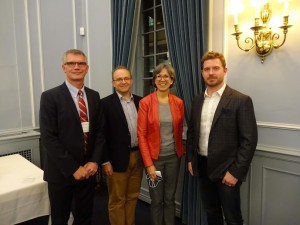Resilience of Commercial Property to Climate Change
The effects of a changing climate are being felt around the World. Extreme weather events are increasingly severe and frequent. Our traditional method of forecasting hazard and risk to property is based on statistical records over the last century. It is no longer a reliable predictor of future risks caused by extreme weather over the life of the property. This is forcing a shift in emphasis from likelihood to consequence and an increased focus on how we survive and continue to function when an extreme event happens. This coincides with a time of accelerating technological change that is concentrating the value of operations and with it the overall cost of loss. Commercial property value is decreasing relative to the value of operations housed within, and market tolerance of business interruption is reducing quickly. The assumptions underlying many practices that commercial building owners and managers have traditionally relied upon are no longer valid. This meeting of the Sandford Fleming Forum will explore how commercial property can be more resilient and so contribute to a more resilient community.

From left: Steven Horwood, Alec Hay, MC Brenda McCabe and Ryan Duffy
Speakers:
Alec H. Hay – Resilience in the Commercial Property Sector
Over the last six months, the Building Owners and Managers Association (BOMA) in Toronto has investigated the need for resilience to climate change and how it might be approached in new and existing infrastructure. This initial phase concluded 1 September 2015 with the publication of a discussion document that explores the issue and BOMA’s role in guiding its members. The findings and the key issues facing BOMA members are presented.
Alec Hay is a principal at Southern Harbour, an infrastructure risk, resilience and security integration consultancy based in Toronto. Following 25 years in the Royal Engineers specialising in fortifications and infrastructure development, he was the Resilience and Security lead at DIALOG before founding Southern Harbour in 2014. He is a director of the Rethink Sustainability Initiative, an adjunct professor at the University of Toronto, International Secretary of the Register of Security Engineers and Specialists, and the Chair of the BOMA Resilience sub-committee. www.southernharbour.net
The slides of this presentation can be found here.
Ryan Duffy – Derisking Future Energy Management
There is a revolution going on in the energy sector. We will explore the opposing points of view; those who recognise the economic and environmental advantages of renewable energy and those running public utilities. We will investigate the financial and capability cost of the disruptive technologies that have created clean and innovative energy opportunities, the fears that it will also jeopardise safety and reliability, and the role of smart grid investment. Resilience in facility energy systems is achievable and cost effective, benefiting your operations and your local community. This presentation will discuss how.
Ryan Duffy is the President and CEO of Blackstone Energy Services Inc, a leading provider of integrated energy solutions. Toronto based, Ryan leads Blackstone’s global team providing energy solutions that range from commodity risk management, energy informatics, and assurance programs to acting as a catalyst for owners and engineers in developing energy efficiency projects, including net zero. He was previously with Westcoast Gas Services (now Engage Energy Canada) responsible for the first electricity transactions in the newly deregulated Ontario market and steered the sale of their Ontario Division to Superior Plus Corp.
Steven Horwood – People. Planet. Profit.
Carbon Dioxide (CO2) provides owners with a long term refrigeration and cooling solution that effectively balances financial, technical, and health and safety performance, with the owners’ Corporate Social Responsibility objectives. Steven Horwood presents a timeline of the key factors that has pushed CO2 development the past two decades along with the most current commercial applications of CO2 and the benefits owners have recognized. Building owners and operators can derisk future function and enhance operating efficiency by changing to CO2.
Steven Horwood is the Vice President of Sales and Operations for Neelands Refrigeration, based in Burlington, Ontario. During his 14 years with Black & McDonald as Service Division Manager and later Business Development Manager he developed a keen interest in sustainability and the strategic value that it can bring to companies. A graduate of Concordia University, he is a noted coach and strategic planner, developing cost efficient operating systems that realise the Corporate Social Responsibilities of businesses while reducing their operating risk and costs.
Please click here for the presentation slides.
October 15, 2015 at 5:30 pm at the University of Toronto Faculty Club
Supported by:





